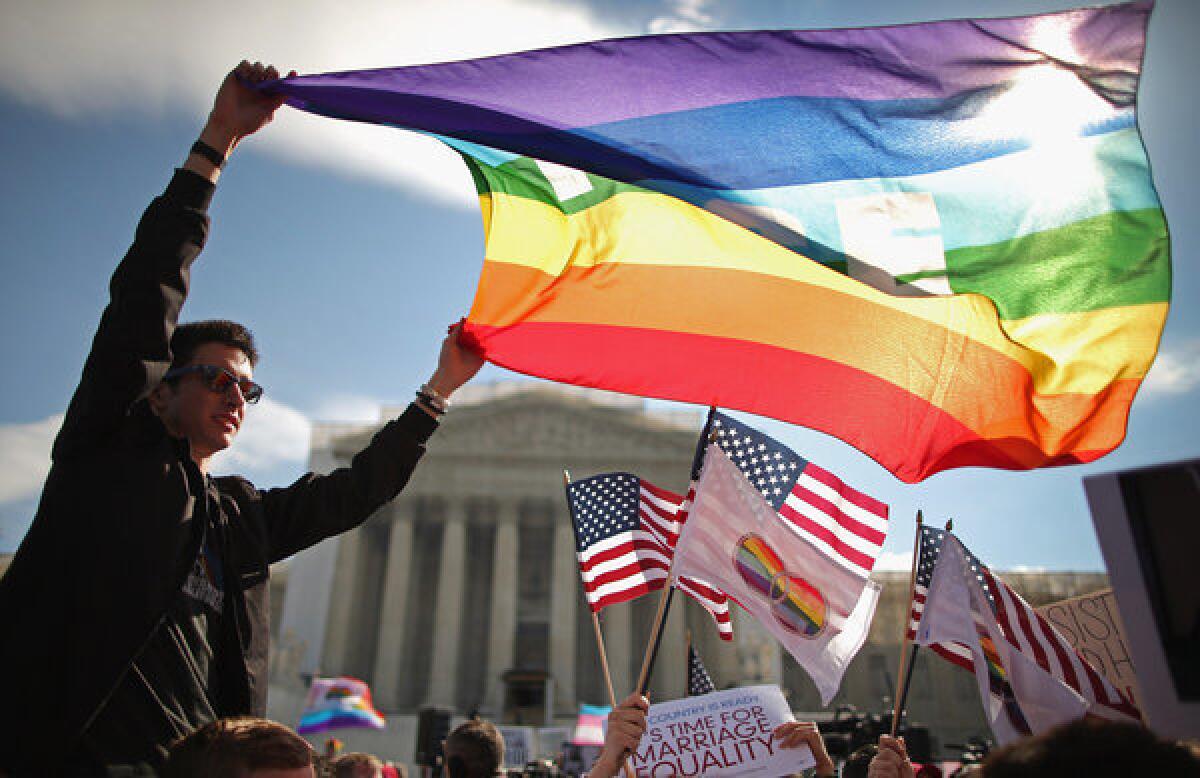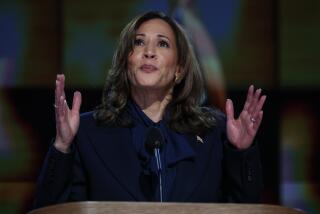Pot, same-sex marriage: Polls shift, but what about the politics?

- Share via
WASHINGTON – The last several years have seen huge shifts in polls on two intensely debated issues: marijuana legalization and same-sex marriage. On one, the change in opinion has prompted public officials to shift ground en masse; on the other, few have changed their stands.
What accounts for the difference?
The latest evidence of change in public opinion comes from a survey released Thursday by the Pew Research Center, which shows a majority of adult Americans, 52% to 45%, now support legalizing marijuana. The finding marks the first time in more than four decades of Pew’s polling that a majority has taken that position. As recently as a decade ago, only about one-third backed making marijuana legal.
Attitudes on same-sex marriage have undergone a similarly rapid shift. Pew’s polls show that since 2013, Americans’ views on same-sex marriage have gone from widespread disapproval, 33% to 58%, to support, 49% to 41%.
On same-sex marriage, the shift among elected officials has been dramatic. In the Senate, for example, 50 members, including 46 Democrats, both independents and two Republicans, now say they support the right of same-sex couples to marry legally. Most of those senators have announced their positions in the last two years.
The total backing marijuana legalization? Zero.
Several factors account for the difference.
“People don’t feel as passionately about their marijuana use as they do about their sexual identity,” said Ethan Nadelmann, executive director of the Drug Policy Alliance, which advocates for legalization. Although polls have trouble measuring that sort of intensity, politicians can gauge it well – gay political activism has grown rapidly in recent years, with marriage equality being a major rallying point.
On the other side of the ledger, although gays have faced pervasive, sometimes violent, discrimination, elected officials who support gay rights have only occasionally suffered at the polls. By contrast, “soft on drugs” has often been an attack line in politics, one which many elected officials fear.
Nadelmann and other supporters of marijuana legalization say they see some shift by elected officials, mostly on the state level, and some in Congress. Last year, 22 members of the House co-sponsored legislation to legalize marijuana. In a recent interview with the Denver Post, House Minority Leader Nancy Pelosi (D-San Francisco) said she thought the federal government needed to “respect” the decisions of Colorado and other states that have chosen to “tax and regulate” marijuana and allow the drug to be used recreationally.
Timing may also have helped the gay rights cause, with a high-profile Supreme Court case prompting lawmakers to take sides just as public opinion reached a tipping point. The last time the Supreme Court considered a major marijuana case, in 2005, public opinion still heavily weighed against legalization.
Some of the differences in poll results on the two issues also may contribute to the different reaction by elected officials. Support for same-sex marriage shows significant cleavages by education level and social class, with college graduates and those who hold professional or graduate degrees being significantly more likely to support marriage rights. Democrats have made huge inroads among precisely that slice of the electorate in recent years, and support for same-sex marriage is one of a suite of issues on which Democrats have established an advantage with those voters over Republicans.
By contrast, support for marijuana legalization appears more uniform across demographic groups, which may make it less useful as a political “wedge.”
Twitter: @DavidLauter
More to Read
Get the L.A. Times Politics newsletter
Deeply reported insights into legislation, politics and policy from Sacramento, Washington and beyond. In your inbox twice per week.
You may occasionally receive promotional content from the Los Angeles Times.











